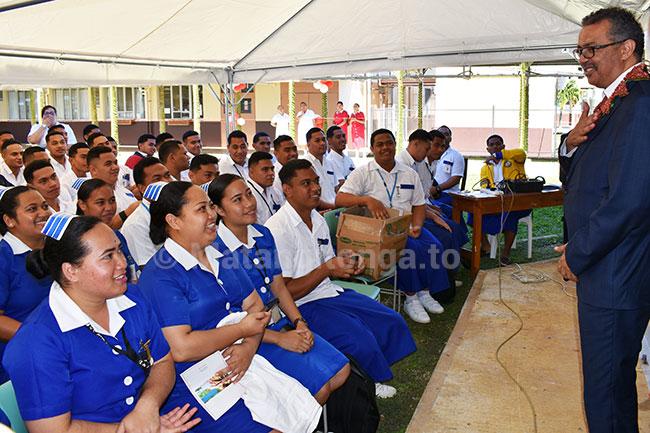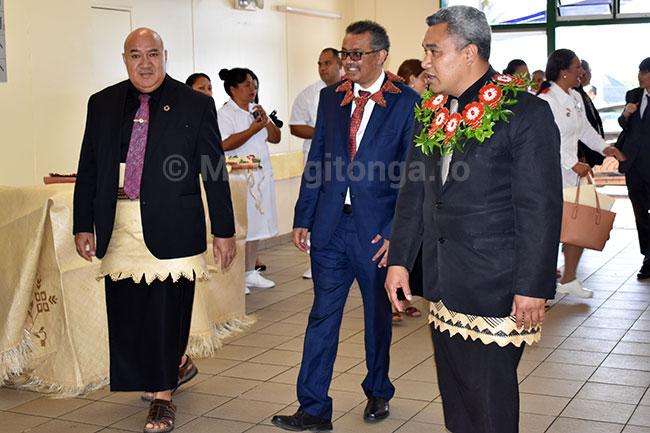
Nurses at Vaiola Hospital impressed the World Health Organisation (WHO) Director General, Dr Tedros Adhanom Ghebreyesus with their singing during a ceremony to welcome him this morning, 9 August.
Dr Ghebreyesus was so impressed he invited them to be part of the International Year of the Nurse and Midwife event held in Switzerland next year.
“So, one thing that actually came to my mind while listening to the beautiful choir, is how about making part of the choir, if not all, to join in Geneva in May when we celebrate,” he said in his keynote address.
“I have never seen anything like this. Mixing the nursing service with choir, it’s so beautiful.”
He said talent is universal but opportunity is not “and we have to pick and show to the world that there is talent even if it’s a small country”.
Dr Ghebreyesus is the first WHO Director General in history to visit Tonga and is meeting leaders, health workers and community members during his stay to gain insights into the kingdom’s health challenges, including non-communicable diseases and the impact of climate change on health.
NCD crisis
Dr Ghebreyesus noted non-communicable diseases as a crisis confronted by hospital staff everyday. Worldwide, 70% of deaths are due to non-communicable diseases (NCDs).
“So, this is not just a problem of the Pacific Islands only, but it’s the whole world,” he said.
While outbreaks like Ebola and natural disasters grab headlines, the epitome of NCDs is even more dangerous because it’s not sudden and dramatic - it’s slow and silent. Unless we address it with the urgency of an outbreak, the NCDs epitome will take a toll for decades to come, he said.
To support the fight against NCDs, WHO is supporting the government on two projects targeting children to end child obesity and promoting health in schools.
“It’s vital that we teach our children healthy habits when they are young.”
Dr Ghebreyesus commended Tonga on its efforts to fight NCDs including increasing taxes on tobacco, alcohol, sugary drinks and other harmful foods.
Climate Change
The impact of climate change on health is one of the strongest arguments for taking action said Dr Ghebreyesus.
“There is a lot of talk about climate change. But for you, this is no abstract discussion. It’s a real and present danger.”
WHO’s vision is for all Small Island Developing States to have health systems that are resilient to climate change by 2030.
“But it’s not enough simply to ask your communities to adapt. Because although you are the most at risk of the effects of climate change you are the least responsible,” he said.
“We must therefore act globally to mitigate the causes of climate change. By 2030, we also see a world in which countries will be reducing their carbon emissions. This will protect the most vulnerable from climate risks and deliver large health benefits in carbon emitting countries.”
“Both of these major threats, NCDs and climate change, demand the same response.”
The welcome ceremony was attended by Tonga's medical health professionals including the Minister for Health, Hon Saia Piukala, Chief Surgeon Specialist Lord Tangi, Paediatric Specialist Dr George 'Aho, Radiology Specialist Dr 'Ana 'Akau'ola, Medical Superintendent, Dr Lisiate 'Ulufonua, and Australian High Commissioner to Tonga HE Adrian Morrison among others.
WHO’s Chief Nursing Officer (CNO), Ms Elizabeth Iro, from the Cook Islands, is also part of the WHO delegation visiting Tonga until 10 August. While at Vaiola Hospital today, the WHO delegation visited the mental health site, rehabilitation centre and the diabetic clinic at the Non-Communicable Diseases Centre.
They also visited the Houma Health Center and Maamaloa Early Childhood Education Centre, Houma district and ‘Ahau, including a mangrove plantation project, to understand how communities deal with health threats posed by climate change and emergencies.
The delegation are on a tour of the Pacific and will attend the Pacific Health Ministers Meeting in French Polynesia, visit Tuvalu to speak at the Climate Change Summit prior to the Pacific Islands Forum, and make a brief official visit to Fiji.







Comments
Tonga has a valuable resource
Tonga has a valuable resource that is not being used to its best potential. The various Pacific Island cultures and their singing is something relatively unique that can be cultivated, harvested, bottled and exported.
See, I told you so! (readers comments: https://matangitonga.to/2019/05/06/can-tonga-grow-its-economy). But in recent days on the Matangi Tonga website I have seen these song-related articles (I save the long versions with pictures):
https://matangitonga.to/2019/05/24/top-pacific-artists-recognized-pacifi...
https://matangitonga.to/2019/07/08/one-tonga-concert-never-fails-impress
https://matangitonga.to/2019/05/23/posthumous-award-composer-queen-salote
Tonga needs export money coming in to help pay its bills, but it is not easy to compete on the global economic stage when your economy is small unless you are offering something that cannot be had anywhere else or is in short supply.
But Tonga will need to get its media professionals together in a decent recording studio or institute of some sort, formulate a plan and start creating what people elsewhere will want to hear and see (ie music videos). They want to see and enjoy a sense of joy, unity, community, group confidence and national pride that they may be sorely lacking where they come from. Show off some of your stuff on Youtube, which will then enthuse people to look for more with their preferred music seller. Tonga has a valuable resource that is not being used to its best potential. Do it properly and I believe it would also boost tourism, with people wanting to come to the live concerts in person. - Paul Black